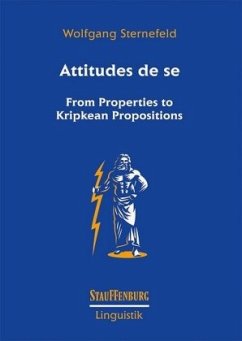The analysis of knowledge and belief has provoked intensive discussions in philosophy and linguistics. One of the issues in this area is the semantics of attitude verbs whose complement expresses a thought about the Self of the thinking person. What is the content of my belief when I think that I am tired? Some philosophers propose it is a proposition, others think it is a property. It will be shown in this essay that existing proposals in either direction are unsatisfying. The property theorist expells the subject of the predicate "tired" from the analysis; their theory is at best incomplete. The propositionalist has difficulties with the analysis of the pronoun that refers back to the subject of the attitude, as is the case with "he" in "Wolfgang believes he is tired." The present new proposal ventures the idea that a conscious person is endowed with their own Logical Space that deviates from the standard model in providing for a separate entity, the Self, as the object or target of inner thoughts about oneself. Moreover, this Logical Space leaves room for linguistic error: in such a model, subjects may be unable to correctly identify the reference of a name or may fail to identify the Self with its bearer. By contrast, reference to the Self is immune to error through misidentification, it is a paradigm case of brute indexicality. In consequence, de se pronouns are rigid designators in the sense of Kripke. The book solves several puzzles of reference failure and explores numerous consequences for the semantics of attitude reports and for possible world semantics in general.

